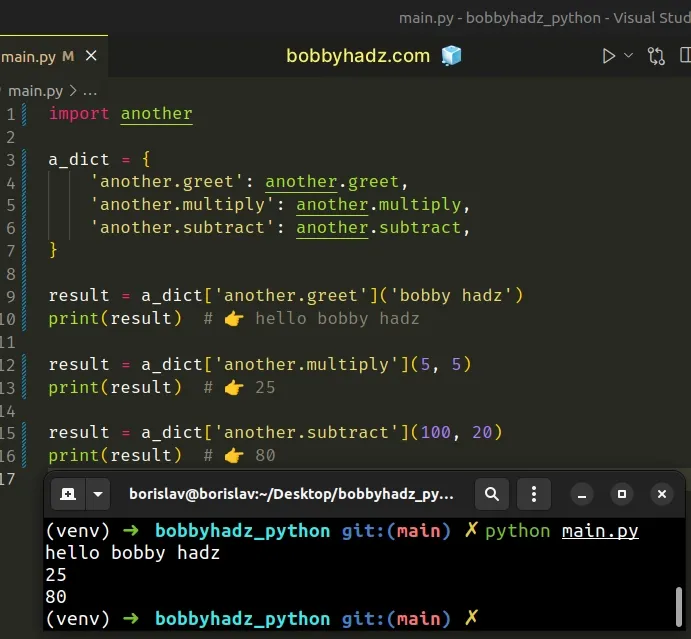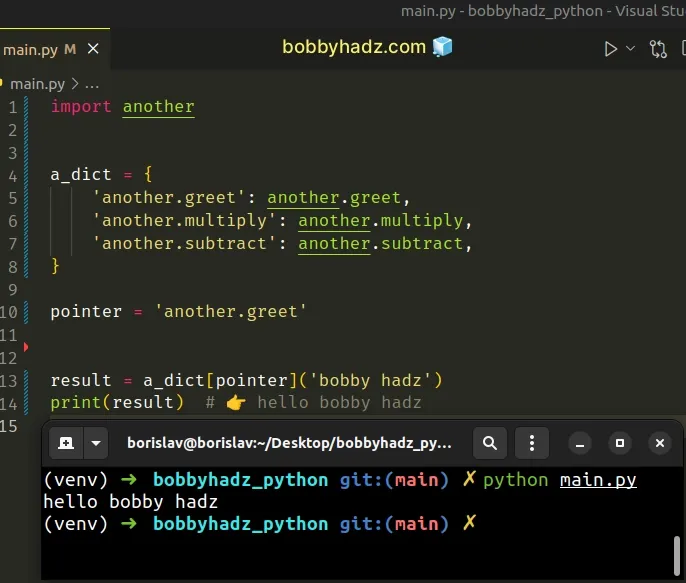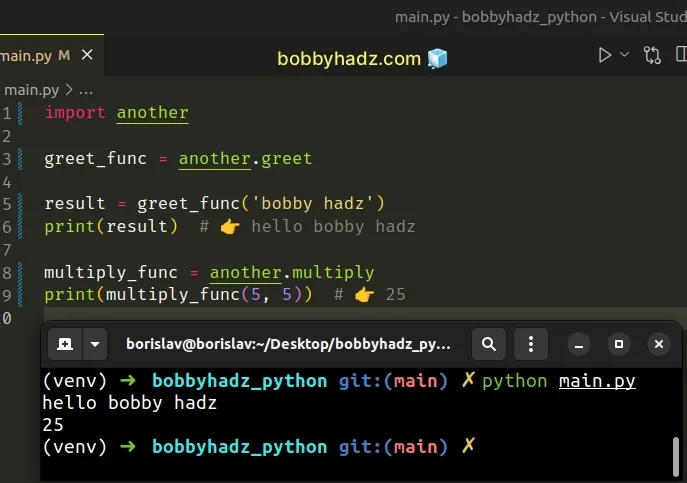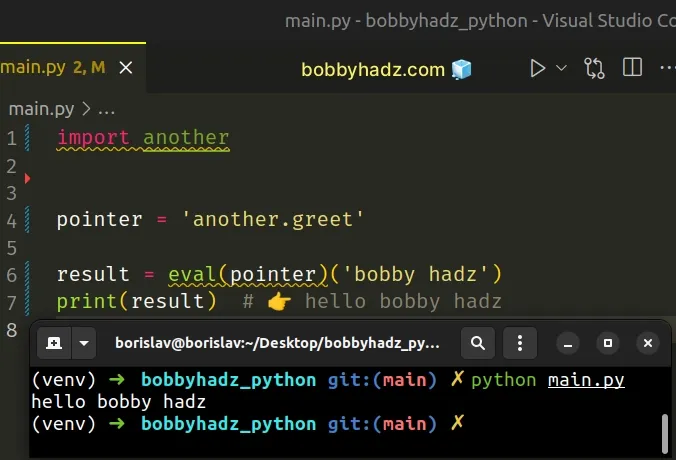How to use Function Pointers in Python [4 Ways]
Last updated: Apr 11, 2024
Reading time·4 min

# Table of Contents
- How to use Function Pointers in Python
- Using function pointers directly in Python
- Using function pointers by calling
eval()in Python
# How to use Function Pointers in Python
To use function pointers in Python:
- Import the module in which the functions are located.
- Define a dictionary where the keys are the points to the functions and the values are the actual functions.
- Call the functions by accessing the dictionary keys.
Suppose we have the following another.py file.
def greet(name): return f'hello {name}' def multiply(a, b): return a * b def subtract(a, b): return a - b
Here is how you can use function pointers in a file called main.py.
import another a_dict = { 'another.greet': another.greet, 'another.multiply': another.multiply, 'another.subtract': another.subtract, } result = a_dict['another.greet']('bobby hadz') print(result) # 👉️ hello bobby hadz result = a_dict['another.multiply'](5, 5) print(result) # 👉️ 25 result = a_dict['another.subtract'](100, 20) print(result) # 👉️ 80

In some cases, you might also have to start with the name of the package.
a_dict = { 'package.module.function': package.module.function, }
We defined 3 functions in the another.py module.
The next step is to import the another module in main.py.
import another
We then defined a dictionary that contains 3 function pointers - one for each
function that is defined in another.py.
a_dict = { 'another.greet': another.greet, 'another.multiply': another.multiply, 'another.subtract': another.subtract, }
The keys in the dictionary are the pointers and the values are references to the corresponding functions.
Notice that we didn't call the functions with parentheses.
You can then call the functions by accessing the keys in the dictionary.
result = a_dict['another.greet']('bobby hadz') print(result) # 👉️ hello bobby hadz result = a_dict['another.multiply'](5, 5) print(result) # 👉️ 25 result = a_dict['another.subtract'](100, 20) print(result) # 👉️ 80
Square brackets [] are used to access the specific key and then parentheses
are used to invoke the corresponding function.
If the function takes parameters, make sure to supply them between the parentheses.
The same approach can be used if the pointer to the function is stored in a variable.
import another a_dict = { 'another.greet': another.greet, 'another.multiply': another.multiply, 'another.subtract': another.subtract, } pointer = 'another.greet' result = a_dict[pointer]('bobby hadz') print(result) # 👉️ hello bobby hadz

The pointer variable stores the pointer string, so we used it between the
square brackets to access the dictionary key.
# Using function pointers directly in Python
There is also a more direct approach.
The example uses the same another.py file.
def greet(name): return f'hello {name}' def multiply(a, b): return a * b def subtract(a, b): return a - b
And here is the related main.py file.
import another greet_func = another.greet result = greet_func('bobby hadz') print(result) # 👉️ hello bobby hadz

In some cases, you might also have to import the module dynamically.
another_module = __import__('another') greet_function = getattr(another_module, 'greet') result = greet_function('bobby hadz') print(result) # 👉️ hello bobby hadz
We used the __import__() method to import the another module and then used
the getattr() method to get the greet function from the module.
I've written a detailed guide on how to call a function by a string name in Python.
We could've also used the importlib.import_module method to achieve the same result.
import importlib another_module = importlib.import_module('another') greet_function = getattr(another_module, 'greet') result = greet_function('bobby hadz') print(result) # 👉️ hello bobby hadz
The method takes a parameter that specifies the module you want to import in absolute or relative terms.
You can also use the str.split() method to split the function pointer string.
import another import sys pointer = 'another.greet' module_name, func_name = pointer.split('.', 1) result = getattr(sys.modules[module_name], func_name)('bobby hadz') print(result) # 👉️ hello bobby hadz
The method takes the following 2 parameters:
| Name | Description |
|---|---|
| separator | Split the string into substrings on each occurrence of the separator |
| maxsplit | At most maxsplit splits are done (optional) |
We used a period as the separator and split the pointer string into a list that contains the module name and function name.
The last step is to use the
getattr function to access the
function based on its name and call it with the second set of parentheses ().
# Using function pointers by calling eval() in Python
You can also use the eval() function when using function pointers.
The example uses the same another.py file.
def greet(name): return f'hello {name}' def multiply(a, b): return a * b def subtract(a, b): return a - b
And here is the main.py file.
import another pointer = 'another.greet' result = eval(pointer)('bobby hadz') print(result) # 👉️ hello bobby hadz

The function pointer string is stored in a variable.
We called the eval() function with the string and it resolved to the actual
greet function from the another module.
The second set of parentheses is used to invoke the greet function.
another module even though it's not directly used in our code.The argument we passed to the eval() function is parsed and evaluated as a
Python expression.
The function returns the result of the evaluated expression (the greet
function in the example).
However, it should be noted that using eval with user-supplied data is not
safe.
The method simply evaluates the supplied Python string, so passing it an unescaped and insecure user-generated string as a parameter is a cause for security concerns.
# Additional Resources
You can learn more about the related topics by checking out the following tutorials:

